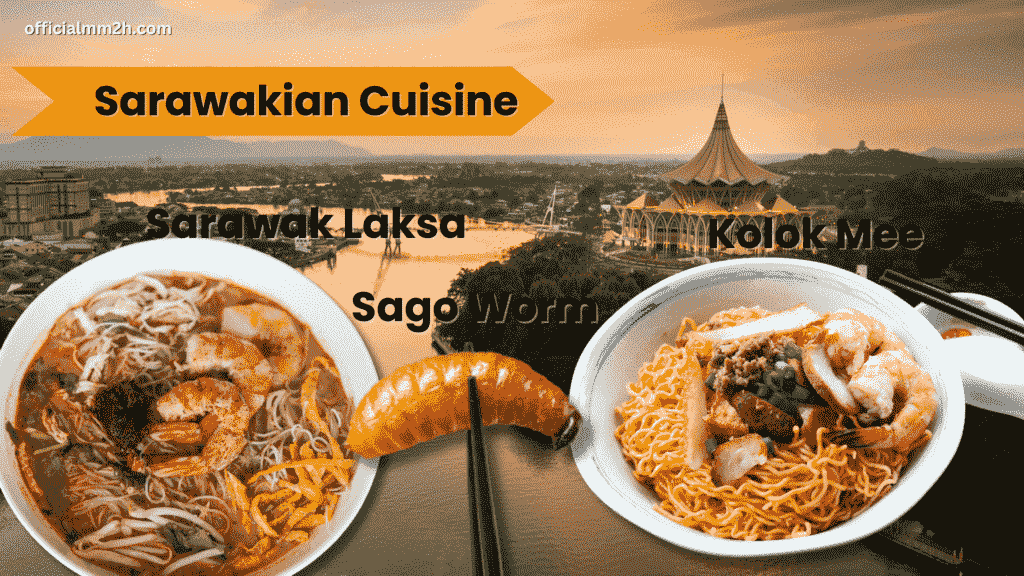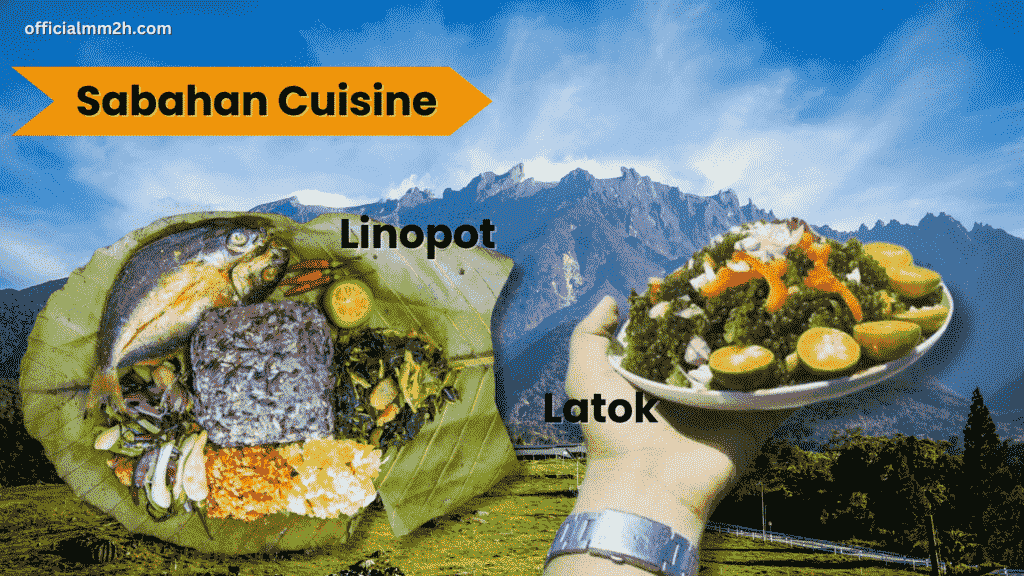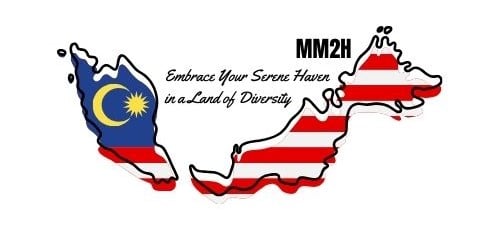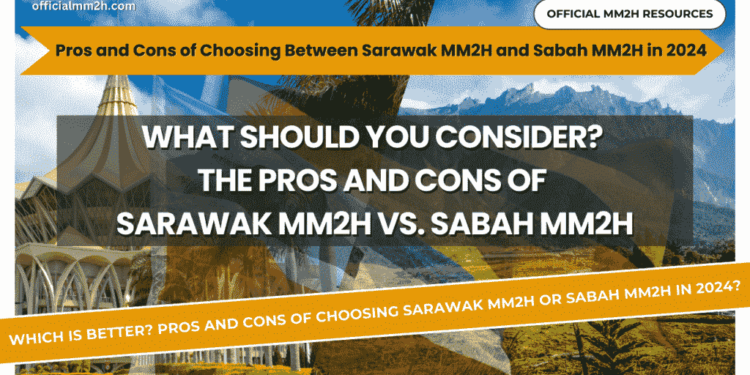Weighing the Pros and Cons: Sarawak MM2H vs Sabah MM2H in 2024
The My Second Home (MM2H) program is an initiative by the Malaysian government that allows foreigners to stay in Malaysia for an extended period. This program is particularly popular among retirees and expatriates looking for an affordable lifestyle in a warm climate. In Malaysia, two states offer their variations of this program: Sarawak and Sabah. Both programs have unique features, terms, and conditions that applicants should understand before making a decision.
Overview of Sarawak MM2H

Sarawak MM2H (S-MM2H) is designed to welcome foreign nationals who meet specific criteria and want to reside in Sarawak. Note that all approved participants must stay in Sarawak for at least 30 days each year to maintain their status in the program. This program is linked to the Ministry of Tourism, Creative Industry and Performing Arts Sarawak, which oversees the application process and management.
The S-MM2H program allows participants to obtain a multiple-entry social visit pass, primarily aimed at retirees or those seeking a quieter lifestyle away from urban chaos. Participants must demonstrate financial stability to support their stay.
Overview of Sabah MM2H

In contrast, Sabah MM2H operates under the auspices of the Sabah state government, specifically the Ministry of Tourism, Culture, and Environment. It shares similar goals to the Sarawak program but has different requirements and benefits. Sabah is known for its rich biodiversity and beautiful landscapes, making it an attractive destination for foreigners.
The Sabah MM2H program requires applicants to stay in Sabah for a minimum of 30 cumulative days each year. Like Sarawak, it is aimed at those looking for a long-term stay in a peaceful environment.
Comparing Terms and Conditions
While both the Sarawak and Sabah MM2H programs share the same core goal of providing a long-term residence option for foreigners, they diverge in several key areas:
1. Age and Eligibility
- Sarawak and Sabah MM2H: Applicants must be at least 30 years old to be eligible. This specific age requirement can narrow down the potential applicants, focusing on a slightly more mature demographic looking for long-term living arrangements.
2. Financial Requirements
- Sarawak MM2H: Individual applicants need to have a fixed deposit of RM150,000, while couple are required to have RM300,000. Additionally, applicants must show proof of income of at least RM7,000 monthly for singles and RM10,000 for families. This requirement ensures that participants can maintain a good quality of life in Malaysia.
- Sabah MM2H: The financial requirements are more explicit. Individual applicants need to have a fixed deposit of RM150,000, while families are required to have RM300,000. Additionally, applicants must show proof of income of at least RM10,000 monthly for singles and RM15,000 for families. This requirement ensures that participants can maintain a good quality of life in Malaysia.
3. Application Process and Fees
- Sarawak MM2H: Applicants are required to submit their forms through licensed representatives and can utilize an online application system. There isn’t a specified application fee openly noted.
- Sabah MM2H: The application fee is established at RM3,000, which is non-refundable, along with a renewal processing fee of RM1,500. All applications must be submitted either online or through a state representative appointed by the Ministry of Tourism, Culture, and Environment.
4. Stay and Visa Duration
- Sarawak MM2H: Participants are issued a visa valid for ten years, with the first five years granted initially. However, they must ensure a presence in Sarawak for at least 30 days each year to renew their pass.
- Sabah MM2H: Participants are issued a visa valid for ten years, with the first five years granted initially. The renewal for the second five years is contingent on completing security checks and meeting minimum cumulative stay period of 30 days per year in Sabah.
5. Work and Investment Opportunities
- Sarawak MM2H: The program allows certain work-related options for participants aged 50 and above, including part-time lecturing and being a sleeping partner in local businesses under specific conditions.
- Sabah MM2H: The program also allows business investment, but there are stringent conditions regarding the type of work allowed. Participants cannot use the MM2H visa for employment purposes directly; it is primarily for long-term residency, thereby keeping the demographic focused on investment or leisure rather than traditional employment.
6. Property Ownership
- Sarawak MM2H: Applicants above 50 years old are not required to purchase property in Sarawak. However, those under 50 must meet one of the following criteria: they must either purchase property (with a minimum price of RM600,000 for Kuching and RM500,000 for other areas), have children studying in Sarawak, or be undergoing long-term medical treatment in Sarawak.
- Sabah MM2H: All applicants must purchase high rise property worth a minimum of RM600,000 in Sabah. This purchase condition promotes local investment and aligns with government policies encouraging foreign investment in real estate.
Pros and Cons of Choosing Sarawak MM2H vs. Sabah MM2H
When considering the Malaysia My Second Home (MM2H) programs in Sarawak and Sabah, it’s crucial to evaluate the advantages and disadvantages of each option. Both programs cater to foreigners seeking long-term residence in Malaysia, but they have distinct features and conditions that can greatly influence your choice.
Pros of Choosing Sarawak MM2H
- Lower Financial Threshold for Property: Applicants above 50 years old are not required to purchase property, making it easier for retirees who may not want the responsibility of homeownership. For those under 50, the minimum property purchase price is RM600,000 for Kuching and RM500,000 for other areas, which is lower than many other places in Malaysia.
- Less Costly Monthly Income Requirement: Sarawak requires a monthly income of RM7,000 for individuals and RM10,000 for families. This is slightly lower than what is required by Sabah, making it more accessible for individuals and families planning their budgeting.
- Flexible Living Arrangements: The program allows for applicants to live without the strict property investment requirements found in Sabah, providing flexibility in lifestyle choices and financial commitments.
- Cultural Experience: Sarawak is known for its rich cultural heritage and diverse communities. This cultural richness can provide a unique living experience compared to other regions in Malaysia.
- Sarawak MM2H participants are allowed to reside anywhere in Malaysia, provided they meet the minimum requirement of staying at least 30 days per year in Sarawak.
Cons of Choosing Sarawak MM2H
- Limited Urban Infrastructure: Sarawak may not have the same level of urban amenities, shopping, or entertainment options as Sabah’s larger cities like Kota Kinabalu. This could affect lifestyle satisfaction for those who prefer vibrant city life.
- Potentially Lower Property Value Growth: The property market in Sarawak may not grow as rapidly as in more popular areas like Sabah, possibly leading to lower investment returns.
- Fewer Immediate International Links: Sarawak’s international connectivity may not be as robust as Sabah’s, which could affect travel ease for expatriates wanting to explore the region or return home.
Pros of Choosing Sabah MM2H
- Stunning Natural Beauty and Biodiversity: Sabah is known for its breathtaking landscapes, including mountains, beaches, and rich wildlife. This makes it ideal for nature lovers and those who enjoy outdoor activities.
- Active Real Estate Market: The requirement for all applicants to purchase property (minimum RM600,000) indicates a commitment to local investment, which can promote community development and investment growth.
- Robust Infrastructure: Sabah boasts well-developed urban infrastructure, including healthcare, dining, and shopping facilities, especially in Kota Kinabalu, providing a comfortable living environment.
- Cultural Richness and Vibrancy: Sabah’s cultural diversity and vibrant festivals offer plenty of opportunities for cultural immersion and engagement with local communities.
- Sabah MM2H holders must obtain “approval” before traveling to West Malaysia. These holders need to apply to Sabah’s immigration authority for the necessary approval first.
Cons of Choosing Sabah MM2H
- Higher Financial Requirements: The monthly income requirements in Sabah are higher, with RM10,000 for individuals and RM15,000 for families, making it a more challenging option for some applicants compared to Sarawak.
- Mandatory Property Purchase: All applicants must invest in property, which can increase financial burdens and responsibilities, particularly for those who may not wish to buy a home.
- Restrictions on Employment: While opportunities for investment exist, the program restricts employment, meaning participants cannot use the MM2H visa for traditional job roles, potentially limiting their engagement in the local economy.
- Application Fees: There is a non-refundable application fee of RM3,000, along with renewal processing fees, which can add to the overall cost of participating in the program.
Conclusion
Choosing between Sarawak MM2H and Sabah MM2H depends on personal preferences, lifestyle, and financial circumstances. Sarawak may be a better option for those looking for lower entry barriers and flexibility in property ownership, while Sabah appeals to those who value natural beauty and urban amenities but are prepared for higher financial commitments. Understanding the pros and cons of each program can help potential participants make an informed decision about their long-term residence in Malaysia.





Hi, I am Mosharraf Hossain from bangladesh. I want to move Malaysia SEZ program in Zohar. What will be the procedure how much will be the total cost
Thanking you
Mosharraf
The Malaysia My Second Home (MM2H) program offers a special variant for Special Economic Zones (SEZs) like the one in Johor, known as Iskandar Malaysia. This program provides various incentives for individuals and investors, focusing on economic activities in SEZs, which come with benefits like tax breaks and a business-friendly environment .
Procedure to Apply
1. Eligibility and Requirements: For applicants aged between 21 to 49 years, you are required to deposit USD 65,000 as a fixed deposit. For those aged 50 and above, the requirement is USD 32,000. You must also stay in Malaysia for at least 90 days per year, which can be fulfilled by you or your dependents .
2. Property Purchase: A compulsory property purchase of RM 500,000 is required if you wish to participate in the Forest City SEZ in Johor .
3. Application Process: All applications must be made through licensed MM2H tourism operators. The application needs to be submitted to the MM2H One Stop Centre, which handles all matters related to immigration and approvals .
4. Fees and Costs:
Government application fee: RM 1,000.
Renewal fee: RM 300 every 5 years .
No additional income or liquid funds are required beyond the fixed deposit and property purchase .
5. Documentation: You will need to provide various documents, including a certified true copy of marriage or birth certificates (if applicable) and translations in English if required. You also need medical insurance and a personal bond .
6. Consultation: It is advisable to schedule a consultation with a specialized agency to help navigate the process, clarify any questions you have, and ensure that all documentation is completed correctly .
By fulfilling these requirements and successfully going through the application process, you can achieve residency under the MM2H program in the SEZ of Johor, Malaysia.
Very useful compare and contrast regarding the benefits and downsides of Sarawak MM2H vs. Sabah MM2H. One thing that may impact the issue of investment in residential property in Sabah is the requirement that one is only allowed to purchase strata property, from a developer, and that one cannot resell the property until 5 years have elapsed. After that one can only sell if one purchases a more expensive property. Thus one cannot purchase a condo to qualify and later sell it and move into a rental unit. These restrictive requirements obviously impact those who wish to purchase property a an investment rather than a permanent residence. Even when one qualifies to sell they cannot do so to someone attempting to purchase property qualify for the Sabah MM2H. I also understand that one may be restricted to the Kota Kinabalu region when purchasing a condo.
Sarawak has no such restrictions, especially if one is over 50 years old. Thus one has more flexibility in residence since one can live anywhere, as long as one meets the 30 days/year minimum visit requirement. One can live in any city in Sarawak, or even in rural areas provided that the land is not Native land.
Second, one can purchase through the secondary market. There is no requirement to ONLY purchase STRATA PROPERTY from a developer. One can purchase Landed Property provided it is zoned as residential property and is not on native land. One can buy from the secondary market. One can sell the property within a year or two, or retain it for longer (there is a real property gains tax that discourages sales within the first five years, however).
Since there is no restriction on purchasing property from a developer a Sarawak MM2H can sell to another Sarawak MM2H buyer.
Thus, if one is required to purchase a property because one is 30-49, once one reaches age 50 one can renew, and sell the property. One can move into the rental market if one wishes.
****
I’d also think that the Infrastructure in Sarawak is much more developed than Sabah. Sarawak has more malls (Aeon, Vivacity, The Spring, City One, Aeroille, The Hills, La Promenade, etc.) and hospital (Normah, Kuching Specialist Hospital (KPJ), Borneo Medical Center, Timberland, as well as the Sarawak General (public) Hospital.
Thank you for sharing these detailed insights on the differences between Sarawak MM2H and Sabah MM2H, especially regarding property investment. It’s crucial for potential applicants to understand these distinctions:
In Sabah, the requirement to purchase only strata properties from developers and the resale restrictions can indeed limit flexibility and impact investment potential. The restriction to regions like Kota Kinabalu further narrows options, which can be a significant consideration for those looking at the program as an investment opportunity.
In contrast, Sarawak offers more flexibility in purchasing both strata and landed properties, including the ability to buy in the secondary market. This flexibility, along with the broader range of living locations and the option to sell more freely (keeping in mind the real property gains tax), makes it an attractive choice, especially for those over 50. The possibility to transition from property ownership to renting after turning 50 adds another layer of appeal.
Regarding infrastructure, Sarawak does seem to offer more developed facilities, with numerous malls and healthcare options, which can be a significant advantage for those prioritizing convenience and access to services.
Thank you again for your valuable comparison. It will certainly help others weigh their options carefully!